Should We Fear Or Embrace Artificial Intelligence?
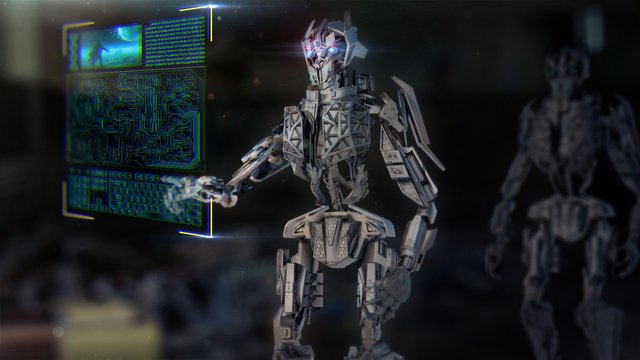
Artificial Intelligence (AI) taking over the world is such a recurring theme in pop culture that it led us to wonder whether this was not a secret human fantasy almost innate in the modern human brain!
“2001: A Space Odyssey”, “Terminator”, “I: Robot” and, more recently, “Ex Machina” are few amongst many books and movies depicting robots showing no consideration to their creators. Sci-fi writer Isaac Asimov would be turning over in his grave with such disdain for his three fundamental laws of robotics:
- A robot may not injure a human being or, through inaction, allow a human being to come to harm.
- Robots must obey the orders given by human beings except where such orders would conflict with the First Law.
- A robot must protect its own existence as long as such protection does not conflict with the First or Second Laws.
In 2017 the reality is undeniably catching up on fiction from a technological perspective. We mentioned in 5 Industries where AI is changing everything the movie trailer for “Morgan”, a 20 Century Fox movie to be released soon:
The fact is that there is no way one could possibly guess that this trailer was made by an AI. This gives a first insight on why we could fear AI from an employment perspective. Producing a movie trailer is not like manufacturing a car. IBM Watson managed to automate more than just basic manual work, it automated creativity. A quality that we thought intrinsically human.
Meanwhile, some of the most brilliant minds have been sounding the alarm in regards to Artificial Intelligence. For instance, Elon Musk, CEO of Tesla, declared that developing AI is just like summoning a demon in reference to AI military purposes.
Quite an ironical statement when knowing that Tesla is in the process of building and testing self-driving cars, therefore, powered by… artificial intelligence. The car manufacturer illustrates all the paradox regarding the AI concern. The Gigafactory, in which the car batteries are produced, is fully automated making traditional human manual work redundant. But not to forget that eventually, autonomous cars coming out of the factory will also be positively impacting the traffic. Indeed, think of all the accidents that are caused by the lack of surveillance, poor decision making or inefficient performance from human drivers. An AI is never tired nor drunk and happens to be 99.99% reliable in regards to the analysis of its environment.
Granted, the artificial intelligence debate is not an easy one. However, it is worth having a discussion early as the issues raised are legitimate. Should we fear or embrace the rise of AI?
Is AI going to take our jobs?
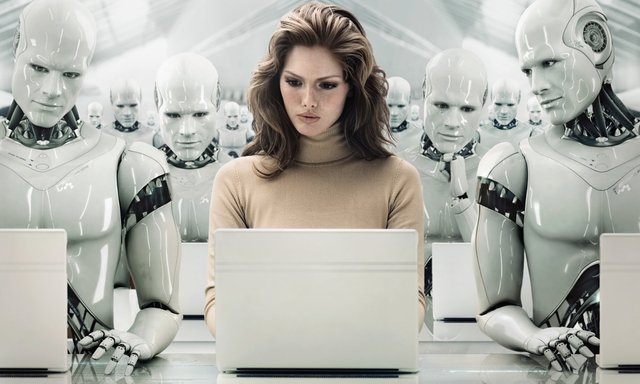
Image Source
Nowadays, AI has undoubtedly become an efficient agent at performing specific tasks. The fact is that they are:
- Able to process large amounts of data in almost no time,
- More accurate in repetitive tasks,
- Able to work indefinitely.
Earlier we mentioned the automotive industry as an example of an industry heavily disrupted by AI but it is far from being the only one:
- Stock trade: AI traders are making huge capital gains on the stock market and turn out to be more efficient than their human colleagues.
- Aircraft: “We want to increase safety by trying to tackle the human-error factor that might be caused by stress, information overload, and sometimes a lack of sufficient and up-to-date training”. This is a statement from Haitham Baomar, who is one of the leaders of a research team aiming to create an autopilot capable of dealing with situations of emergency.
- Health Care: The start-up Infervision built an AI that can read X-ray images and identify early signs of lung cancer.
Even though AI is still in its infancy in the fields mentioned above, it is interesting to point out the fact that robots are not dealing here with repetitive and manual tasks. They are involved in calculating, analyzing and adapting to challenging situations. And, therefore, competing with highly qualified positions such as traders, pilots or doctors. In brief, AIs are starting to become smart. Despite not reaching an awareness level yet, they are now capable of learning, reasoning, and understanding in order to fulfill a specific mission.
So how long should we wait before they take over our jobs?
In 2013, researchers from Oxford estimated that nearly 50% of all occupations in the US could be at risk because of computerization within one or two decades. However, a 2016 McKinsey study states that such results are to be qualified. Automation will for sure affect more or less every sector of activity, but AIs will hardly be replacing individuals job for job.
Change will be gradual
If companies are likely to hire fewer people for a given occupation, they will not be firing 50% of their staff overnight. The McKinsey study highlights the fact that analyzing the tasks performed made more sense than focusing on the occupation. Indeed, machines will assist humans in some of their tasks but not completely replace them. Actually, as for today, many occupations can already be partially automated such as:
- Waiters and waitresses: 77% of automation potential
- Cashiers: 49% of automation potential
However, companies need time to invest and implement new processes and tools that embody AI. Can you imagine a small restaurant sacking all its waiters and replace them by Wall-E from one day to the next? Probably not.
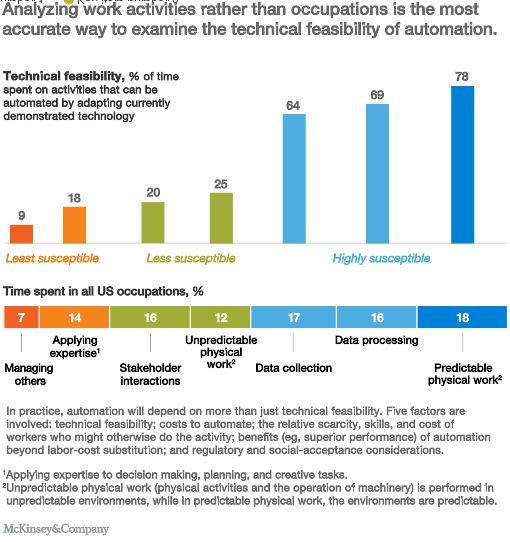
Image Source
A process of “Creative Destruction”
Creative Destruction is known as the “process of industrial mutation that incessantly revolutionizes the economic structure from within, incessantly destroying the old one, incessantly creating a new one”. A new technology will undeniably make an older and less performant one redundant. Think of film cameras that were made obsolete by digital cameras that then suffered severe competition from smartphones. But just like new industries are replacing old ones, new jobs are replacing old jobs. Web Developers, Social Media Managers, SEO Consultants, Application Developers, UX Designers, Software Engineers, Mooc Coordinators or even Bloggers did not exist 20 years ago before the arrival of the Internet in every household. Similarly, artificial intelligence is likely to generate new occupations. Robots will have to be built and maintained, right? By way of illustration, here are some potential roles that will be required in our future society:
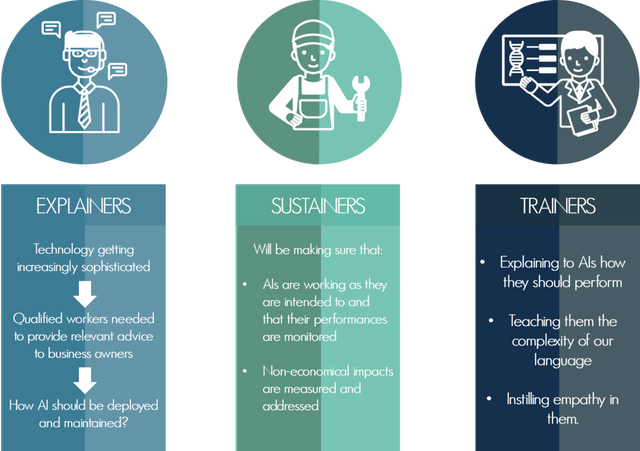
Image Source
The virtuous circle of innovation
Not to mention that AI implementation will have a massive impact on businesses’ productivity. The productivity gains could either be used for:
- Lowering prices: an indirect consequence would be a demand increase. How to cope with the production increase if not by hiring new workers?
- Increasing profits, which could lead to investments in new machines that will have to be maintained.
- Pay higher salaries, which could lead to a higher level of global consumption, thus creating new jobs in the overall economy!
Well, this might seem a bit theoretical. What about having a look at Amazon? Over the years, the online retailer has been using an increasing number of robots to carry out its activity. In 2015, Amazon had 30 000 robots used in particular to automate the picking and packing process. That figure increased by 50% in the next year. What were the consequences?
- Thanks to the efficiency gain, Amazon manages to keep prices as low as possible. As a matter of fact, shipping still costs the symbolic amount of 0.1 cents for a standard delivery.
- Did anyone lose their job? Nope. In 2014, the company employed 154 000 people. Latest count? Approximately 300,000 people work for Amazon as of today.
Adapting the society
Perhaps wondering whether AI is to destroy or to create jobs is not the right question to ask ourselves in the first place. We should perhaps focus more on how to adapt to a society in which not having a job is not so much of an issue.
As of today, losing a job can have disastrous effects on the individual. Indeed, the income loss can badly affect the living standards of a household. If automation due to AI is to spread on extensive segments of our economy, job scarcity could become a reality in the long run. Making millions of low-paid jobs redundant but also some high-paid ones.
If so, inequalities and unemployment may rise to unprecedented levels. Large corporations going crazy on automation would be making huge profits as they will be saving tremendous amounts by not paying any more workers. Meanwhile, a majority of unemployed individuals might be struggling to make ends meet.
To fix this macroeconomic problem, Bill Gates recently made a valid point by suggesting a “robot tax”, just like the government charges on income tax on human labor:
If human workers are to be replaced by robots, the latter should be taxed at the same level, right? AI taxation could then operate a better wealth balance between companies and individuals. Indeed, the revenues could provide our governments with the necessary funding to finance innovative reforms.
- “Love jobs”
Some occupations can by definition not be undertaken by robots. When it comes to empathy or care, machines can hardly replace any human as they are not able (yet?) to express true feelings. And people do not want artificial caretakers. With a growing and aging population, such occupations will definitely be required. Taking care of the elderly, providing high-quality education to kids are challenges that our society will have to take up. These are only some examples. The robotization of our economy gives us a great opportunity to focus on interaction and sense-of-purpose occupations.
- A Universal Basic Income
You may have already heard of this social policy as it is starting to become a trendy topic. The idea is to grant a minimum wage that will allow anyone, regardless of his or her situation, to live decently. Some experimentations are already taking place in Canada, Switzerland, and Finland. That could possibly begin a new era that utopian thinkers would not disavow. And it might be high time to consider it as we could end on the dole if robots replace us. Such a post-work society would consist of:
- A disconnection between wages and work,
- The possibility for anyone to focus on more creative and fulfilling activities.
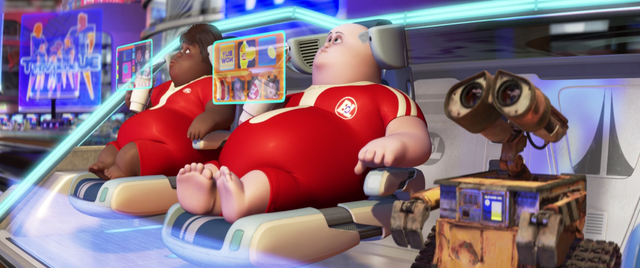
Image Source
The Fear of a Weaponized AI
A common pop culture fear is that at some point AIs will turn against us to either kill or enslave us.
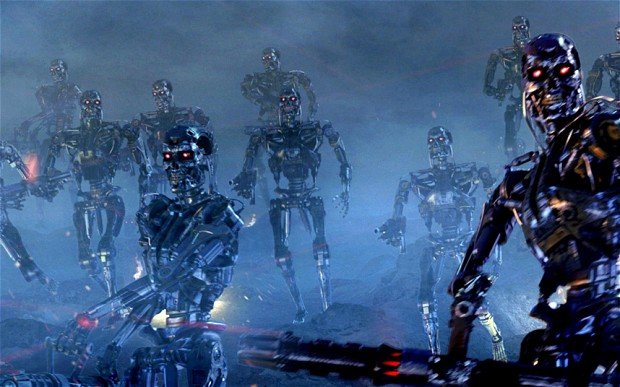
Credits: Warner Bros
Nevertheless, the scenario of AIs going crazy is unlikely to happen. One major requirement is lacking: awareness and, hence, free will. Today’s robots are smart to the extent that they are able to learn and use knowledge to undertake actions in a specific context. Such actions and contexts are programmed by humans. As a consequence, as long we do not program AIs to kill or enslave us, humanity can sleep soundly.
But is it the case?
Some examples can legitimately give us shivers up and down the spine. South Korea, for instance, has created a sentry gun which is able to detect and engage a target in a completely autonomous way. The Russian army, for its part, has developed FEDOR, a robot able to shoot guns with a disturbing accuracy.
Besides, even though the purpose is harmless, AI could become detrimental to humans if it is poorly designed. Remember, robots are goal-oriented. They will try to achieve it in the most optimal way. What if, then, humans stand in the way?
In the Apprentice Sorcerer from Fantasia, Mickey Mouse animates a broom to clean the castle. He can therefore relax and have a nap. Nonetheless, when Mickey finally wakes up, he discovers with horror that the broom has duplicated itself to be more efficient and has flooded the castle to achieve his goal. The castle is clean but Mickey would have drowned if he had not woken up in time.
For an AI, the end justifies the means and this is what roboticists must be wary of.
Humans taking Action
The Future of Life Institute is a volunteer organization working on mitigating technological risks that humanity is and may be facing. It was founded by MIT cosmologist [Max Tegmark]) and Skype co-founder Jaan Tallinn. Its board of advisors includes, in particular, cosmologist Stephen Hawking and entrepreneur Elon Musk. In 2015, the organization wrote an open letter condemning weaponized AIs as they could be a serious threat to humanity.
The Institution acknowledges the fact that there are many good for and against arguments for AI soldiers. On the one hand, the use of autonomous weapons would avoid having human soldiers on the battlefield, therefore reducing the number of casualties. But on the other hand, countries might find that not being limited by human resources is an incentive to go to war.
This argument is not anecdotic in a rather geopolitically unstable world. What if a major military power starts investing heavily in Lethal Autonomous Weapons (LAWs)? The only possible outcome would be an AI arms race that could have damaging consequences.
Any weapon can be resold on the black markets easily and consequently end up in the hands of a dictator or a terrorist group. Would human lives be spared? Nothing is less sure. The Future of Life Institute concludes that if battlefields can be made safer thanks to AI, it just cannot be by creating automated killing tools.
Other organizations such as the Campaign to Stop Killer Robots or the Convention on Conventional Weapons (CCW) are also lobbying to ban the production of LAWs.
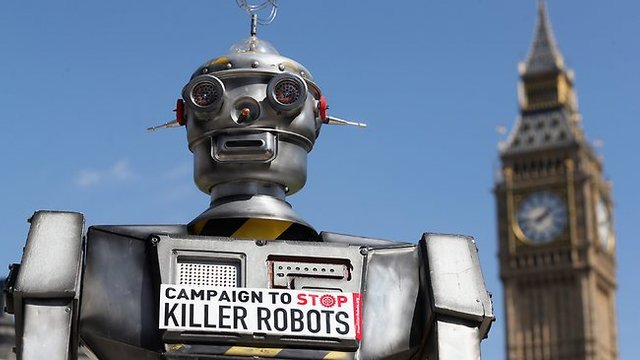
Image Source
Conclusion
Building a bright future for humanity and artificial intelligence cohabitation depends on one entity only: US. Indeed, it is up to us to anticipate the future in order to establish relevant regulation in regards to AI development such as:
- Instilling ethics in AI systems, just like the Three Asimov Laws of Robotics, so that AIs are unable to harm human beings
- Starting to adapt our societies to the world in which automation would make redundant many of our current manual jobs (training programs for career change, higher allowances for unemployed individuals, increased taxation for automation-oriented companies)
- Implementing state regulation to avoid AI being built in a goal-oriented way only and set up national commissions to watch on businesses.
To some extent, yes, we should fear AI. The fear of what AI could be used for, or the impact that it could have on our societies, should push us to figure out innovative ways to draw the best out of them without having to deal with the worse.
In a recent interview, Gary Kasparov, ex-chess master, explains why humanity should embrace artificial intelligence. Ironically, the former chess world champion was once beaten by Deep Blue, a computer conceived by IBM. However, he does not hold a grudge against it and appears truly optimistic in respect to a future in which humans and AIs would be cohabiting. If the calculation power of machines is unbeatable, he insists on the fact that they still “have no curiosity, no passion and most important, […] no purpose”. Therefore, for us, “it’s all about new challenges, it’s all about new horizons”. Human beings have the required ambition and will to take up the challenges of our generation:
- Space exploration,
- Environment protection,
- Fighting against poverty,
- And much more.
And AIs can assist us in these struggles.
I have had so many discussions about AI's being good or bad, whether they are going to take our jobs or if our future will just be a big horrific episode of Black Mirror. I think humans adapt. AI's will not take our jobs, they will take jobs that take our time, just like assembling lines were automatized decades ago. We already see AI's working in customer service (you have an interesting AI on your blog as well). But that only means that instead of dealing with basic questions from customers, you have the time to focus on improving UX in much much more important ways.